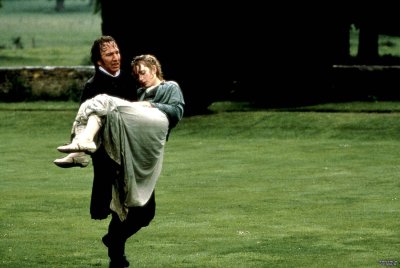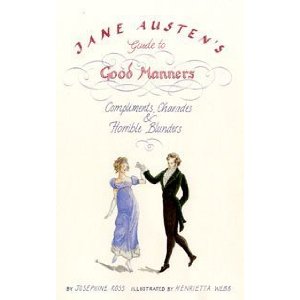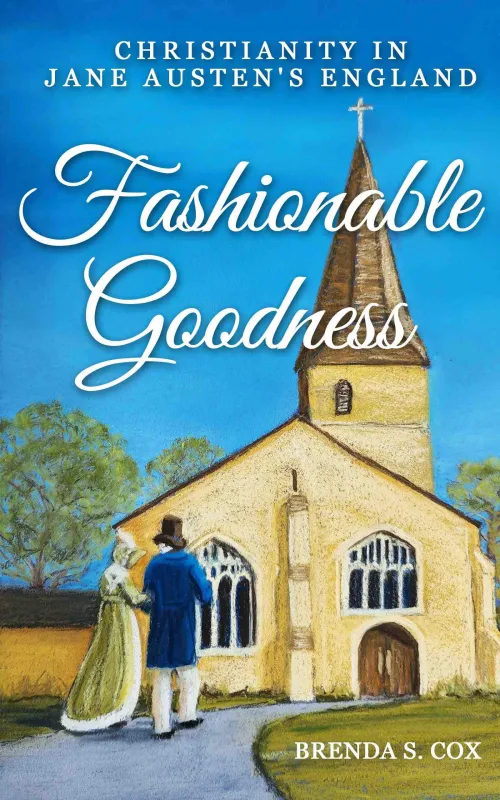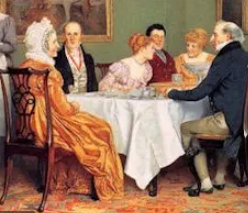Is chivalry alive and well? Good question. I venture to guess that a large number of Jane Austen’s readers subscribe to the traditional hero as embodied in Mr. Darcy, Mr. Knightley, Colonel Brandon, and Captain Wentworth, all admirable men, who despite some flaws, are wont to treat a lady with respect and come to her rescue out of a sense of duty, or from good breeding or a besotted heart.
Just in time for Valentine’s day comes Queendom.com’s tudy on gender roles in courtship behavior, which reveals that while most courtship conventions have changed, some age-old romance rituals are still going strong. Pulling up on a white horse isn’t necessary for the modern woman, but some chivalry is still a heart-melting must. (Inquiring readers, I have ventured to put my own spin (in blue) on this contribution from lona Jerabek, Ph.D.)
Some men hurtled, on horseback, with a giant stick in their hands. Emperor Shah Jahan built The Taj Mahal as a final resting place for his most beloved wife. Both Cleopatra and Juliet refused to live in a world where they couldn’t be with the one they loved. Thankfully, courtship conventions and romantic gestures need not be this extreme. According to Queendom’s data, most men and women take a modern approach to dating, but a little chivalry can still go a long way.
Jane Austen’s rules of courtship vs modern times
Collecting data from 950 men and 1621 women, Queendom’s research on gender roles and courtship reveals that:
- 77% of men and 70% of women feel that a date can be initiated by either gender. In fact, 65% of the women have either asked a man out on a date, or would be willing to do so. (This would be a big faux pas in Jane Austen’s book, for a gently bred lady would NEVER make the first move, lest she be thought forward. There were those who had powers of persuasion through beauty and words, like May Crawford, or who took advantage of a man during a moment of weakness and, like that rat terrier, Lucy Steele, never let go. Others, like Marianne Dashwood, ignored society’s strictures, but all in all, a young lady of good breeding would hesitate to step out of the bounds of propriety and bring shame upon her family by acting upon her impulses and brazenly ask a man to pay court. Her actions would be much more subtle than that.)

Mr. Darcy listens to Elizabeth about Lydia’s predicament, then quietly goes about rectifying the situation and helping Lydia out of a scrape. A true romantic hero.
- 67% of men and 60% of women believe that chivalry is important (e.g. opening doors, pulling out chair, etc.). (This number would have been 100% in Jane’s day. A man who failed to follow the rules of propriety, like John Thorpe, would instantly be regarded as deplorable and wouldn’t stand a chance.)
- 60% of women still like to be wined and dined, at least in the initial stages of dating. (Courtship was much more constrained, with the virginal girl guarded like hawks by her chaperons and family. After her coming out, a woman would NEVER be seen alone in her swain’s company. The only time they could touch or talk at length was during the set of a dance. They could never dine alone in an inn, for instance, without damaging her reputation. As for drinking wine, a gently bred girl might be given a glass of watered down elderberry or orange wine, but nothing that would make her tipsy and lose control.)

At first blush it is Willoughby who seems heroic, but it is the quieter Colonel Brandon who rescues Marianne from her untidy tendencies.
- 26% of men want to be the one who controls how the relationship plays out (i.e. how many dates they should have, how fast the relationship moves, when to meet each other’s family). 39% of men would prefer to let the woman control the direction of the relationship, 35% prefer it to be a mutual decision. For women, 27% want to be in full control, 31% prefer to let men decide; 43% prefer it to be mutual. (Back in the Regency era a wily woman could manipulate the situation behind the scenes, like Charlotte Lucas, in order to snare her man, but most, like Jane Bennet, were passive and took their cues from their suitor’s actions or family’s wishes. A Regency miss who takes control of her courtship or acts in a hasty and willful manner was regarded a hoyden, as with Lydia Bennet and Maria Rushworth, two stupid girls who were the instruments of their own undoing.)

Anne yearned. Anne desired. But she could do nothing. It wasn’t until Captain Wentworth took pen in hand and wrote his swoon-worthy letter that he opened up the way to their blissful romantic reunion.
- When it comes to popping the question, 66% of men and 65% of women think it’s fine for the woman to do the asking. (Not in Jane Austen’s day, when men were obligated to do the asking. A women’s sole power, that of choice, was exercised before marriage. It was up to her instinct and good judgment to refuse a cad or accept a good man for a husband. Heaven forbid if love clouded her good sense. Unless she was an aristocrat, the family would accede to her wishes, for once she married, she would have no rights and lose control of her money, land, and children. Thus a young woman (girls in many instances) had to be smart about her choice of mate or rely on wise council. Unfortunately for Miss Anne Elliot, her wise council, Mrs. Russel, turned out to be wrong and poor Anne had to wait eight long years before she could marry Captain Wentworth and find happiness in his arms.)
- In terms of who pays for the first date (a long-standing debate), 47% of men feel that the man should pay; 24% feel that the bill should be split; 29% stated that whoever initiated the date should pay. On the women’s side, 31% feel the man should pay, another 31% feel that the bill should be split, and 38% indicated that whoever initiated the date should pay. (Now this is a tricky one, for in Regency times many a fortune hunter was able to inveigle an invitation to dinner or a party for which others paid, including his intended’s family. There were some bachelors who traveled from house to house and, aside from their personal expenses, never parted with a penny. The woman might not literally dig into her reticule to pay for the cad’s board and food, but in the instance of a fortune hunter, he most likely did not foot the bill either, except for a trinket or two with which to woo his heiress.)
- And that old “play-hard-to-get” theory? Still just a theory. Only 19% of men and 28% of women believe that a woman should be mysterious and play hard to get for the first few dates. (Elizabeth Elliot played hard to get and where did that get her? At 29 she’s staring spinsterhood in the face. Good old Charlotte Lucas took the horse by the reigns and saddled her man, albeit a fairly defective one. Mr. Collins had a house and a job, which was all that Charlotte wanted or needed. She encouraged him to garden, while spending her days alone in her private parlor.)
“Women no longer need to play the more submissive, demure role – and it’s nice to see that both genders support this progress,” states Dr. Ilona Jerabek, president of PsychTests. “This doesn’t mean that men are off the hook and don’t need to put an effort into romance anymore. The modern woman still likes romance, but it’s now a shared endeavor, with both genders putting an effort into the relationship. What fascinated us most about this study was that younger men and women had somewhat more traditional courtship views than older age groups.” (It is obvious from the following statistics that attitudes towards chivalry and courtship have changed drastically in 200 years. Imagine a young and spirited woman like Elizabeth Bennet adopting any of the following modern attitudes!:)
Age differences in courtship perceptions: surprising results
Queendom’s age comparisons reveal several interesting differences:
- 28% of men under 30 and 22% of men over 30 feel that the man should plan most of the dates.
- 60% of men under 30 and 76% of men over 30 feel that a woman should be able to propose to a man.
- 20% of men under 30 and 13% of men over 30 said that they would feel threatened by a woman who took control of what they did on the first date.
- 26% of men under 30 and 14% of men over 30 believe that it should be the man who asks the woman out, not vice versa.
- 51% of men under 30 and 39% of men over 30 believe stated that the man should pay for the first date.
- 66% of women under 30 and 71% of women over 30 have either asked a man out or would consider doing it.
- 64% of women under 30 and 72% of women over 30 think it’s ok to be the one to ask a man to marry them.
The modern way vs Jane Austen’s way of beguiling your beloved
- Forget the dozen roses. Buy one, wrapped with a ribbon. (200 years ago: Give her a posy of fresh wild flowers that you picked in a field.)
- Show up at your partner’s workplace and whisk him or her away for lunch. (200 years ago: Sit in the drawing room with your intended and let her wind her wool skein over your hands or suggest that you draw his silhouette.)
- Place a love note in your partner’s lunch bag or on the bathroom mirror. (200 years ago: sing a duet at the pianoforte and make sure that the bench is a tad small.)
- Grab a blanket, a bottle of wine, and drive out to a place where you can see the stars. (200 years ago: arrange a walking party with your sisters and cousins and ask him to tag along. Have the servants grab the blankets and wine, and drive you to your location.)
- Slow dance in your living room. (200 years ago: Make sure to solicit her hand for the supper dance, wherein you shall spend another pleasurable hour in her company.)
- Avoid embarrassing lingerie no-nos. Take him to a lingerie store and show him all the naughty things you like. (200 years ago: drop your handkerchief near your exposed ankle for him to retrieve, or make sure that your loveliest eye-catching locket nestles snugly between your well-exposed breasts. )
- Meet at a local hang-out and pretend you’re two strangers flirting with each other. (200 years ago: make goo goo eyes at each other in the drawing room while others play a musical instrument, or pretend that you don’t like each other and trade bantering insults.)
- Build a little bonfire in your backyard and make chocolate Smores. (200 years ago: engage in a game of archery and set out an al fresco tea.)
- Get tango or salsa lessons together. (200 years ago: ask the music master to visit the village to teach the latest dances.)
As you can see, gentle readers, while the rules of romance have changed over the years, the game remains the same! What would Jane Austen have thought of today’s courtship rules, I wonder?
Queendom.com , a subsidiary of PsychTests AIM Inc. , is a site that creates an interactive venue for self-exploration with a healthy dose of fun. PsychTests AIM Inc. originally appeared on the internet scene in 1996, providing psychological assessment products and services to human resource personnel, therapists, academics, researchers and a host of other professionals around the world.

































